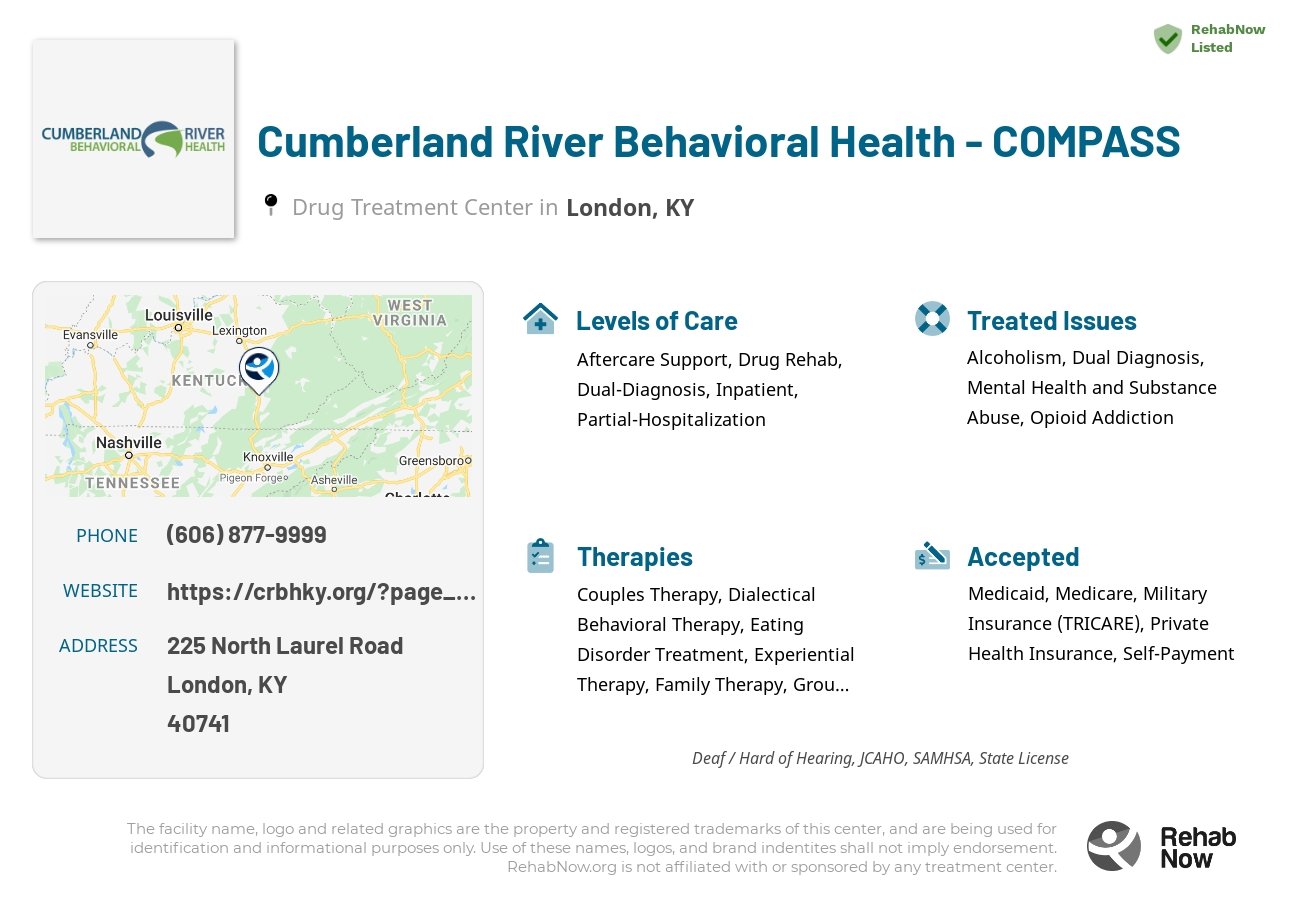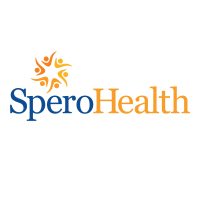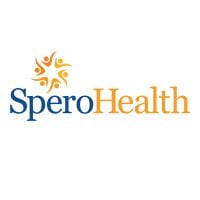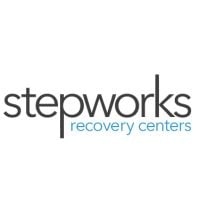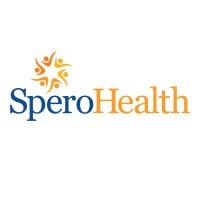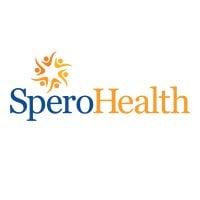Cumberland River Behavioral Health - COMPASS
Drug Rehab Center in London, Kentucky
Cumberland River Behavioral Health - COMPASS is an accredited and licensed health center that provides comprehensive treatment services for drug and alcohol addiction, as well as dual diagnosis, eating disorder, and other substance abuse issues with personalized care, aftercare support, and private health insurance acceptance.
Multiple patients have reported Cumberland River Behavioral Health - COMPASS as permanently closed.
Research other rehabs in London, Kentucky, or get help finding an open facility.
About Cumberland River Behavioral Health - COMPASS in Kentucky
Cumberland River Behavioral Health - COMPASS, located in Corbin, Kentucky, is a residential treatment program focusing on crisis stabilization for children and youth. This facility is unique for its comprehensive approach to ensuring clients achieve their highest potential for living satisfying, productive, and valued lives, with a sensitivity to cultural needs and an encouragement for active participation in treatment.
- Comprehensive Care: Offers a wide range of services including service coordination, evaluations, and medication management.
- Cultural Sensitivity: Tailors treatments to be sensitive to the cultural needs and differences of each client.
- Active Participation Encouraged: Clients are encouraged to be active participants in their treatment, enhancing the effectiveness of their recovery journey.
Cumberland River Behavioral Health - COMPASS holds accreditations from JCAHO, SAMHSA, and a State License, highlighting its commitment to high-quality care. The facility aims to provide quality services accessible to all clients, featuring an integrated system of care that includes family programs and support groups.
The facility treats a variety of issues such as Alcoholism, Dual Diagnosis, Opioid Addiction, Eating Disorder, and Drug Addiction. Treatment methods include Drug Rehab, Dual-Diagnosis treatment, and Partial-Hospitalization, with levels of care ranging from Inpatient to Aftercare Support to suit individual needs.
Genders
Ages
Modality
Additional
Accreditations
State License
SAMHSA

JCAHO
Conditions and Issues Treated
Opioid addiction is when someone becomes addicted to opioids. This can happen quickly due to any opioid use. Opioid withdrawal can be uncomfortable and lead the user to continue using even if they want to quit. It’s best to receive inpatient treatment for detoxification.
Even if a person doesn’t need inpatient treatment, it’s recommended to start rehabilitation or at least some kind of outpatient treatment. This is because the withdrawal symptoms from opioids can be uncomfortable and unpleasant, to the point that a person could end up using again or worse.
Detoxification should be done to break the physical addiction of opioids. This can be done with opioid replacement therapy, medication-assisted therapy, or a more traditional detoxification program. Intensive outpatient treatment is a form of addiction care that allows patients to continue living at home while undergoing treatment. This type of care is appropriate for patients who have been treated in residential treatment programs. Intensive outpatient programs include regular visits to the facility providing therapy, and patients gradually return to their routine life. IOP benefits most when patients have a supportive family member or friend to help them recover.
The first step to getting into an intensive outpatient program is to attend a detoxification facility. Detoxification facilities are designed to remove substances from the body safely. The patient will attend sessions designed to help them understand their addiction and its impact on their lives. While in an intensive outpatient program, therapy sessions are scheduled three to five times per week, with the patient attending no more than two sessions in one day.
Dual Diagnosis therapy is considered more successful than traditional rehab methods because it treats the addiction and the underlying mental health disorder simultaneously. This comprehensive approach gives London, KY patients the best chance for long-term recovery. If the patient does not receive treatment for both conditions, they are more likely to relapse.
Levels of Care Offered
This center offers a variety of custom treatment tailored to individual recovery. Currently available are Aftercare Support, Drug Rehab, Dual-Diagnosis, Inpatient, Partial-Hospitalization, with additional therapies available as listed below.
Inpatient facilities offer a complete rehab program where the patient stays for an extended period. This allows the staff to monitor the patient on a round-the-clock basis and provide medical assistance if needed.
A significant benefit of inpatient rehab is that it allows for a safe environment for treatment. The patient doesn’t have access to drugs or alcohol, and they’re surrounded by people that want them to succeed and change their lives. Treatment starts with detox and behavioral therapy, followed by group therapy and family involvement.
PHP or Partial Hospitalization Program treatment is a treatment that takes place in a treatment facility for an individual affected by addiction. This treatment is generally more than outpatient treatment and less than inpatient treatment. It can be adjusted for an individual’s treatment needs.
Aftercare support is often overlooked in the treatment of drug and alcohol addiction. However, it’s an essential part and should be considered when planning a course of rehab.
Aftercare is a term that’s used to refer to any sort of continuing care offered for a drug addict who has voluntarily entered a rehabilitation program. This type of care can be provided in several settings, including outpatient therapy sessions after the addict has completed an inpatient program. There are also 12-step support groups, such as Alcoholics Anonymous, which can provide additional help for addicts trying to stay sober.
Aftercare is vital because addicts often face many challenges as they attempt to recover from drug addiction or alcoholism. Because of the powerful nature of these addictions, those who struggle with a drug or alcohol problem will likely have to face the craving for their substance of choice for the rest of their lives. Recovering can be a lonely and frustrating endeavor, especially without the support of others who are going through similar situations.
Therapies & Programs
Individual Therapy is a crucial component of addiction recovery. Therapists work with patients to identify the root of their addiction and figure out how to better handle the issues that led to them using drugs. Individual Therapy is one on one sessions where people meet with their therapist. Individual therapy provides a safe space for people to open up and discuss personal and sensitive topics which they may not feel comfortable discussing in a group setting.
In this type of therapy, therapists can develop specific solutions for each patient, which helps speed up their recovery process. In addiction recovery, therapy is a crucial part. It allows patients to go deep into their core issues and discover how those problems can be better handled now. Therapy can be performed in individual sessions as well as group settings. In individual therapy for addiction, the patient meets with the therapist one-on-one to focus on the underlying issues of addiction and come up with solutions to prevent future abuse.
Addiction can take a heavy toll on relationships, damage the trust and intimacy that was once there. Couples therapy at Cumberland River Behavioral Health - COMPASS helps to rebuild the trust and intimacy that has been damaged. An intimate relationship with a drug addict is not healthy for children or anyone in the family. Therapist help to rebalance family roles and create a healthier environment after rehab in London, KY.
Family therapy is a crucial part of drug treatment and getting sober. It is one of the most effective ways to help addicts stay on the path to long-term sobriety. One of the most important parts of family therapy is the relapse prevention plan. During treatment, therapists and doctors will often sit down with the addict and their family to develop a plan if the addict ever feels like they want to use again. This plan should involve steps the addict and family can take together to prevent them from relapsing in the future.
An addict’s family can play a vital part in helping them to avoid relapse because they can spot the warning signs and help them get back on track before it becomes too much of a problem. Family therapy is one of the most effective ways to help addicts stay on the path to long-term sobriety.
Group Therapy is employed by drug treatment centers like Cumberland River Behavioral Health - COMPASS to provide the recovering addict with a platform to talk about their feelings and experiences. It also provides for an opportunity to learn from other addicts who have successfully overcome their addiction. It is recommended that all group members be recovering addicts for this type of therapy to work.
This type of therapy involves the use of a variety of therapeutic techniques to help addicts recover from past traumas that might have triggered their substance abuse. During these sessions, therapists will work with the addict to address painful memories and learn how to cope effectively with stressors as they arise.
During these types of sessions, therapists will typically focus on three main goals:
- Identifying and expressing painful emotions associated with past traumas.
- Reducing the effects of stress on an addict’s life by developing more effective coping mechanisms.
- Developing healthy ways of thinking about stressful situations that can help addicts avoid substance abuse issues in the future.
This type of therapy is typically used in conjunction with other types of addiction treatment services. By identifying and dealing with the root cause of addiction, most addicts can overcome their cravings and prevent relapse once they leave rehab.
Many different types of addiction treatment services exist to help addicts safely get sober, but it’s important for recovering individuals to find a therapist or support group that will help them address the root cause of their addiction.
Dialectical behavior therapy (DBT) is a type of cognitive behavioral therapy that is focused on helping those with problematic behaviors caused by intense emotions and thoughts control and regulate their emotions and behavior.
Dialectic Behavior Therapy is beneficial for:
- People who have chronic suicidal thoughts and behaviors
- People who have chronic drug cravings
- People who have difficulty establishing and maintaining personal relationships
- People who have a mental disorder such as Borderline Personality Disorder
- People who have experienced trauma in their life
Cognitive Behavioral Therapy (CBT) is an approach and method in psychotherapy. Cumberland River Behavioral Health - COMPASS asks people to investigate how their thoughts, including habitual, harmful, and inaccurate ways of thinking, affect behaviors. CBT is based on the idea that rigid, inflexible ways of thinking cause people to have a limited ability to cope with stress, which leads to emotional distress.
Likewise, CBT helps people identify maladaptive behaviors and replace them with more positive behaviors. It makes you look at the way you perceive something and ask: Is this a realistic belief? CBT asks people to look at the role of behaviors and emotional responses and how they may be distressing in one’s life. The goal of CBT is to change the way people think and behave to achieve a more balanced, healthier lifestyle.
Moreover, CBT has been shown to reduce some types of anxiety disorders, depression, and symptoms related to thoughts or actions that are considered harmful.
Life Skills Services provide services aimed at helping people enter into and maintain long-term sobriety. The services are offered at varying levels of intensity, specific to the needs and requirements of each patient. Some benefits of these services are restoring hope and empowerment, enhancing family involvement, increasing patient compliance, and reducing relapse rates.
Training someone on improved life skills allows someone recovering from an addiction to feel more capable of taking care of him or herself. The skills taught in Cumberland River Behavioral Health - COMPASS are daily skills that give a better recovery foundation by simply giving the person tools they need to survive.
Patient Experience
Experiential Therapy at Cumberland River Behavioral Health - COMPASS
Experiential therapy at Cumberland River Behavioral Health - COMPASS includes helping people work through emotional disorders by participating in events in real-time. It moves away from conventional talk therapy to discuss their concerns and emotions by making patients play roles or use props. It allows people to handle trauma and feelings healthily, reducing the need to resort to alcohol and substances in London, KY.
Payment Options Accepted
For specific insurance or payment methods please contact us.
Is your insurance accepted?
Ask an expert, call (888) 674-0062
Cumberland Behavioral River Health Associated Centers
Discover treatment facilities under the same provider.
- Cumberland River Behavioral Health - Haven House in London, KY
- Cumberland River Behavioral Health - Independence House in Corbin, KY
- Haven House in London, KY
- Cumberland River Behavioral Health - Crossroads in Corbin, KY
- Cumberland River Behavioral Health - Harlan in Harlan, KY
Learn More About Cumberland Behavioral River Health Centers
Additional Details
Specifics, location, and helpful extra information.
London, Kentucky 40741 Phone Number(606) 877-9999 Meta DetailsUpdated April 15, 2024
Staff Verified
Cumberland River Behavioral Health - COMPASS Patient Reviews
There are no reviews yet. Be the first one to write one.
London, Kentucky Addiction Information
Kentucky ranks among the top ten states for opioid-related overdoses. Most of these are due to heroin, fentanyl, and prescription opioid use. A little over 11% of the Kentucky population abuses alcohol in a given year. More than 15% of Kentucky adults admit to participating in binge drinking every month.
In Kentucky, 1 in 5 people struggle with addiction to drugs or alcohol. The most common substances of abuse are alcohol, marijuana, and opioids. Every day, more than 8 people die from drug overdoses in Kentucky. In Kentucky, there are over 200,000 people who struggle with addiction to drugs. There are a variety of treatment options in London. Some of the most common include inpatient and outpatient treatment and medication-assisted treatment.
Treatment in Nearby Cities
- Maysville, KY (105.2 mi.)
- Morgantown, KY (142.2 mi.)
- Mount Washington, KY (100.7 mi.)
- Mc Kee, KY (20.5 mi.)
- Henderson, KY (197.1 mi.)
Centers near Cumberland River Behavioral Health - COMPASS
The facility name, logo and brand are the property and registered trademarks of Cumberland River Behavioral Health - COMPASS, and are being used for identification and informational purposes only. Use of these names, logos and brands shall not imply endorsement. RehabNow.org is not affiliated with or sponsored by Cumberland River Behavioral Health - COMPASS.





